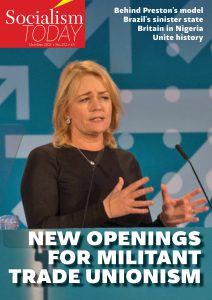
The victory of Sharon Graham as general secretary of Unite, amongst the biggest trade unions in the UK and Ireland and undoubtedly the most influential industrially and politically, has struck the labour movement as a thunderbolt. The Socialist Party and our sister parties in Scotland and Ireland supported Sharon and campaigned for her election. In the midst of the Covid crisis, this can be a pivotal moment for the trade union movement.
The roots for Sharon’s election are in the acute capitalist crises that have opened up that can be traced back to the Great Recession of 2007-08, the subsequent cuts barrage of Cameron and Osborne, and now the Covid pandemic. Workers have literally had to fight for their lives over the last 18 months but increasingly now have to struggle for their livelihoods as the bosses and their Tory government begin to go on the offensive.
Read more